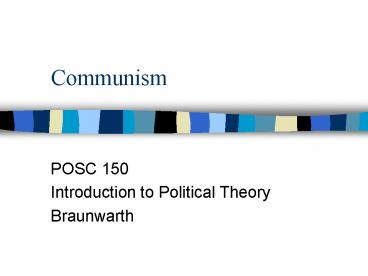Communism - PowerPoint PPT Presentation
1 / 20
Title:
Communism
Description:
1917 Russian Revolution. Fed up with defeats and shortages WWI ... Led to counter-revolution by landowners and other privileged groups (whites) ... – PowerPoint PPT presentation
Number of Views:38
Avg rating:3.0/5.0
Title: Communism
1
Communism
- POSC 150
- Introduction to Political Theory
- Braunwarth
2
Russian Society late 19th c.
- Keeping up with the rest of Europe?
- No, very backward, illiterate, and superstitious
- The nobility spoke French
- Semi-Feudal, peasant society
- Economy based on agriculture
- Is this the setting for a Marxist Communist
Revolution? - No - very small proletariat
3
Russian Politics
- Much Discontent
- from both Peasants and Intellectuals
- No freedom of debate/discussion
- opposition parties outlawed
- spies and informers everywhere
- prisons full of dissidents
- some illicit pamphlets, terrorism
4
Lenin (Vladimir Ilyich Ulyanov)
- Older brother executed for trying to assassinate
Tsar Alexander II - Went underground, became a revolutionary, and
took the name of Lenin - Plunged into an extensive study of Engels and
Marx
5
Leninism
- Learned class struggle is the driving force of
historical development - Must take advantage of class distinctions
- Any means necessary to achieve ends
- Hardened against softness
6
Vanguard Party
- What is it?
- Small, organized group of revolutionary
intellectuals - Need to agitate, organize, and educate the
workers to their true interests - Needed to overcome trade union consciousness
- Revolution would be more likely with
immiserated proletariat and vanguard
7
1917 Russian Revolution
- Fed up with defeats and shortages WWI
- March riots in big cities, troops join in
- Tsar Nicholas replaced by Kerensky
- October Bolsheviks storm Winter Palace
- Seized mines, mills, factories, etc.
- Led to counter-revolution by landowners and other
privileged groups (whites) - 1918-1920 civil war Reds won
8
Russian Communism
- Lenin needed the Vanguard of the Proletariat to
bring about the revolution in Russia - Did the resulting state whither away as predicted
by Lenin? - Why or Why not?
- Example of The Iron Law of Oligarchy
9
China Overview
- About same size as U.S.
- over 1 billion people v. 255 million
- Similar Climate, settled East to West
10
China 19th c.
- Decline to Desperation (much starvation)
- Situation very similar to Russia
- Very small proletarian (1 in 200)
- Large Peasant population
- Very poor, largely feudal (war lords)
- Also, exploited by Imperialist Powers
- Opium Wars
- 1850s series of Peasant Revolts
11
Dr. Sun Yat-Sen
- Born 1866 in a poor farming family
- founded Kaomintang Party (KMT)
- Led rebellions against emperors including
successful 1911 revolution - Good intentions but co-opted by foreigners
- Died 1925
12
Mao 1893-1976
- Librarian (educated)
- restricted to what had been translated into
Chinese Communist Manifesto, Lenins Imperialism - Founding member of Chinese Communist Party 1921
13
Chiang Kai-Shek
- General in imperial army
- Joined KMT
- Succeeded Sun yet-sen
- Actively opposed to Mao and communists
14
1935 The Long March
- Mao with army of 200,000
- 1 year capture 160 cities, cross 16 mountain
ranges, innumerable rivers, - average 24 miles/day
- with conscripts, lost 400,000
- end up in caves in Yenan province
- guerilla warfare, befriended people
- swim like fish in the ocean
- set up small self-sufficient communism
15
Japan invades 1937
- Chiang Kai Shek solidifies power
- More concerned with communists disease of the
heart - KMT blunders in both wars
- Mao fights much better
- 1946 Communists begin taking over
- After 1949 Chiang Kai Shek takes wealth and flees
to Taiwan
16
Revolution 1949
- Nation instead of Class
- Not so much internal class warfare as
- anti-imperialist war of national liberation
- Rural Proletariat
- Lot of emphasis on oppressed people
- They supported him
- Revolution began in countryside
- Model for revolution in Asia and Africa
17
Progress under Mao
- Virtually eliminated starvation, prostitution,
female infanticide, female foot binding,
profiteering - kicked out foreign corrupters
- Agriculture increases 4/year
- Industrial production increases 11
- small is beautiful
- built dams, reclaimed land, etc.
18
Always Fighting USSR model
- 1957 Hundred Flowers
- encouraged criticism of entrenched elite
- 1958 Great Leap Forward
- Industry in small cottage industries
- Neither worked well
- Still very poor country
- People largely enthusiastic
19
Cultural Revolution 1966
- Revolution within the revolution
- Saw problems in USSR
- Tried to return power to people rather than
entrenched elites - Moved elite and intelligentsia to country
- Set back production some and education a lot
- Ultimately couldnt stop the ILOO
- C.R. eventually manipulated by elite
20
Post Mao
- After death in 1976 Deng Xiaoping
- emphasis on Economic Development
- some introduction of Free Mkt economy
- No corresponding Political Freedoms
- Tiananmen Square 1989































